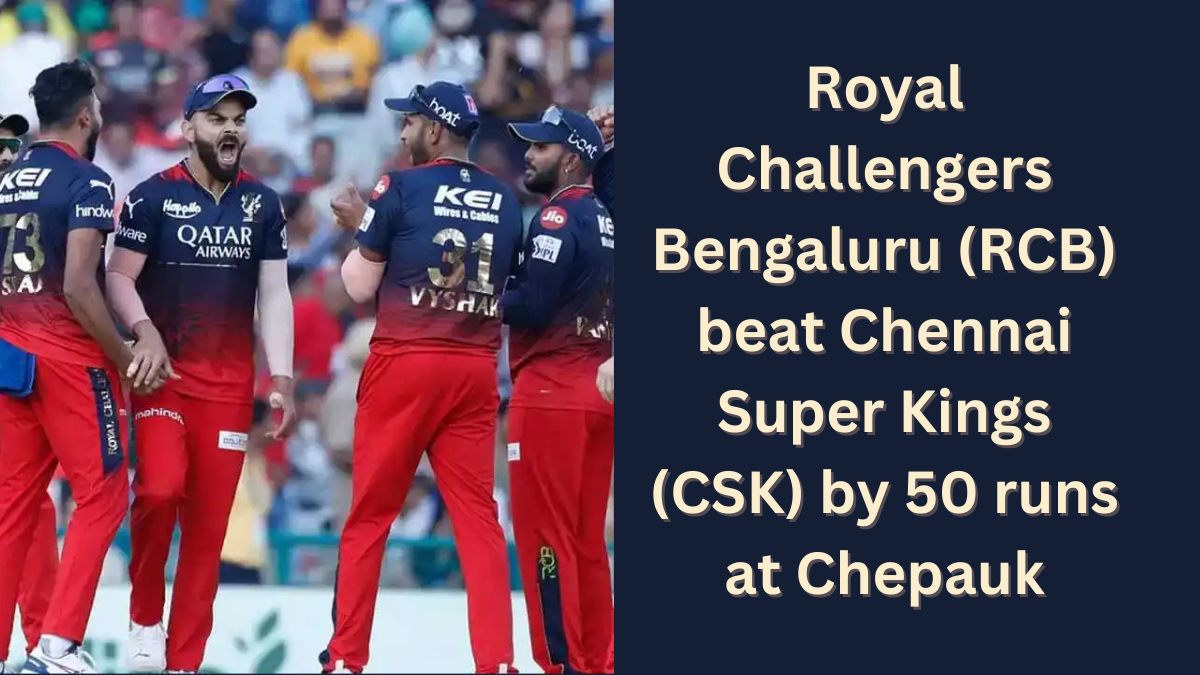At the venerable M. A. Chidambaram Stadium (Chepauk), the Royal Challengers Bengaluru (RCB) displayed a powerful exhibition of cricket, defeating the Chennai Super Kings (CSK) by 50-runs. Along with becoming RCB’s first victory at Chepauk since the first Indian Premier League (IPL) season in 2008, this loss dealt CSK their worst home run loss.
The Innings of RCB: a Combining of Aggression and Caution
Following a winning toss and choosing to bat, Virat Kohli and Phil Salt’s opening duo gave a consistent start. Renowned for his classical style, Kohli anchored the innings with a careful 31 off 30 ball score. Although Phil Salt made strong stroke play, his knock was cut short by a stumping by MS Dhoni, so highlighting the experienced wicketkeeper’s continuing ability.
The momentum changed when Rajat Patidar, commanding RCB in this game, grabbed front stage. Aggressive batting by Patidar resulted in a fast half-century, giving the innings much-needed boost. Especially damaging was his cooperation with Tim David on the death overs. David’s three straight sixes in the last over off Sam Curran drove RCB to an impressive 196 for 7 in their stipulated 20 overs.
Chase: Early Setbacks and Challenges for CSK
With a target of 197, CSK’s innings started off unsteady. Josh Hazlewood, RCB’s pace leader, struck early, quickly dismissing skipper Ruturaj Gaikwad and Rahul Tripathi in turn. CSK staggered at 8 for 2 from this double blow.
Rachin Ravindra, who hit 41 off 31 balls, valiantly tried but CSK found it difficult to create significant partnerships. Under duress, the middle order collapsed; important players like Shivam Dube and Sam Curran failed to contribute significantly. Liam Livingstone and Suyash Sharma’s combined spin helped to control the scoring, therefore strengthening RCB’s hold on the game.
Late Flourish by Dhoni: Too Little, Too Late
Entering the crease with the team in dire straits, MS Dhoni provided a glimpse of his vintage finishing abilities. In the final over, Dhoni smashed back-to-back sixes and a boundary off Yash Dayal, adding 16 runs to CSK’s total. However, this late surge was insufficient to alter the outcome, as CSK managed only 146 for 8 in their 20 overs, falling short by 50 runs.
Tactical Misreads and Pitch Conditions
Stephen Fleming, CSK’s coach, voiced annoyance with the team’s incapacity to evaluate the Chepauk pitch conditions post-match. Batting became increasingly difficult in the second innings as he observed that the surface did not react as predicted—that expected dew did not materialize. This misinterpretation underlined continuous problems in using home conditions to their advantage and helped explain CSK’s poor performance.
Connotations and Looking Ahead
With this triumph, RCB moves to the top of the IPL 2025 points ranking, having won the tournament two times already. The win’s all-encompassing character—especially breaking a 17-year skid at Chepauk—will surely inspire the club as it moves through the season.
For CSK, this loss is a major setback that emphasizes the need of reflection and strategic recalibration. Aiming to bounce back in the next contests, addressing problems with pitch evaluation, batting depth, and adaptability will be very vital. Their search for a sixth IPL victory will depend much on the team’s capacity to grow from this experience and apply remedial actions.
Conclusion
At Chepauk, the collision between RCB and CSK was evidence of the erratic and exciting character of T20 cricket. Strategic batting, disciplined bowling, and good fielding taken together by RCB produced a deserved triumph. Performances like these highlight the need of flexibility, correct pitch assessment, and grabbing important opportunities—elements that usually define success in this very competitive league—as the IPL 2025 season develops.
